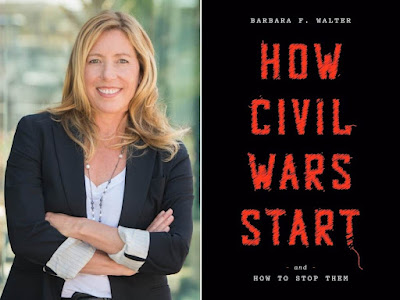The subtitle to this book, “And How To Stop Them,” immediately informs readers that the author perceives civil wars worldwide as a problem in the present and the future.
The author builds her case by explaining that both autocracies and healthy democracies are largely immune from civil war; the countries in the middle ground are most vulnerable. Walter terms these nations “anocracies,” having elements of democracy and autocracy.” Examples include Turkey, the Philippines, Brazil, and sadly the present United States after the January 6th insurrection. And this is where more and more countries, including the United States, are finding themselves today.
The author certainly possesses the qualifications and perspective to write this book. Barbara F. Walter is the Rohr Professor of International Relations at the School of Global Policy and Strategy at the University of California, San Diego. A life member of the Council on Foreign Relations, Walter helps run the award-winning blog Political Violence at a Glance and has written for The Washington Post, The Wall Street Journal, Los Angeles Times, Reuters, and Foreign Affairs.
Political violence rips apart several towns in southwest Texas. A far-right militia plots to kidnap the governor of Michigan, try her for treason, and then lynch her. An armed mob of Trump supporters and conspiracy theorists storms the U.S. Capitol. Are these isolated incidents? Or is this the start of something bigger?
Walter then presents her case carefully with compelling evidence. First, she reviews the rise of factionalism, studying the numerous miscalculations of the United States in Iraq with its willful blindness to a thousand years of religious factionalism that has torn apart the nation.
She then reviews the breakup of Yugoslavia after the death of its leader Marshall Tito and how the various ethnic groups – Serbs, Croats, Bosnians, and more – then launched genocidal attacks on one another, all in the name of ensuring power for their own group.
Walter explains the pernicious role of social media weaponized against democratic institutions in nations such as Brazil and The Philippines. In both countries, unknown candidates won national elections on the strength of using social media to demonize their opponents and turn election results into mandates to oppress and punish “the other side.”
Over the last two decades, the number of active civil wars around the world has almost doubled. Walter reveals the warning signs—where wars tend to start, who initiates them, what triggers them—and why some countries tip over into conflict while others remain stable. Drawing on the latest international research and lessons from over twenty countries, Walter identifies the crucial risk factors, from democratic backsliding to factionalization and the politics of resentment.
Walter makes the case that a civil war today won’t look like it did in the 1860s, where soldiers wore blue or grey uniforms and marched in straight lines. Instead, the civil war will begin with sporadic acts of violence and terror, with social media providing the spark of grievance and outrage.
The author does not downplay or exaggerate the risks, highlighting the election of Barack Obama in 2008 as a lightning rod for white resistance. Walter cites the growth of the Tea Party, wild conspiracy theories about Obama as either a foreigner or terrorist, and the growth of far-right extremist groups.
At the end of the book, Walter does explain that the United States is on the cusp of accomplishing something few other nations have done. A peaceful transition of power when the ethnic majority slips into the minority. In the United States, whites will become about 49 percent of the U.S. population somewhere around 2042.
Yet Walter does not discount the wild and often-crazed conspiratorial frenzy of media personalities like Alex Jones. To frame Jones as a future cautionary tale instead of a “nut,” Walter quotes the French author/philosopher Voltaire, who said, “Those who can make you believe absurdities can make you commit atrocities.”
After all, as the House January 6th Committee digs further into the insurrection, what they have found is not a “false flag operation” or a spontaneous outburst of violence by supporters of a president on the losing side of an election. Instead, it was a highly coordinated attack upon democratic institutions by a lame-duck president, a cabal of toadying advisors, the wife of a Supreme Court Justice, and a well-organized attack by far-right white supremacy groups.

Comments
Post a Comment
Thank You for your input and feedback. If you requested a response, we will do so as soon as possible.